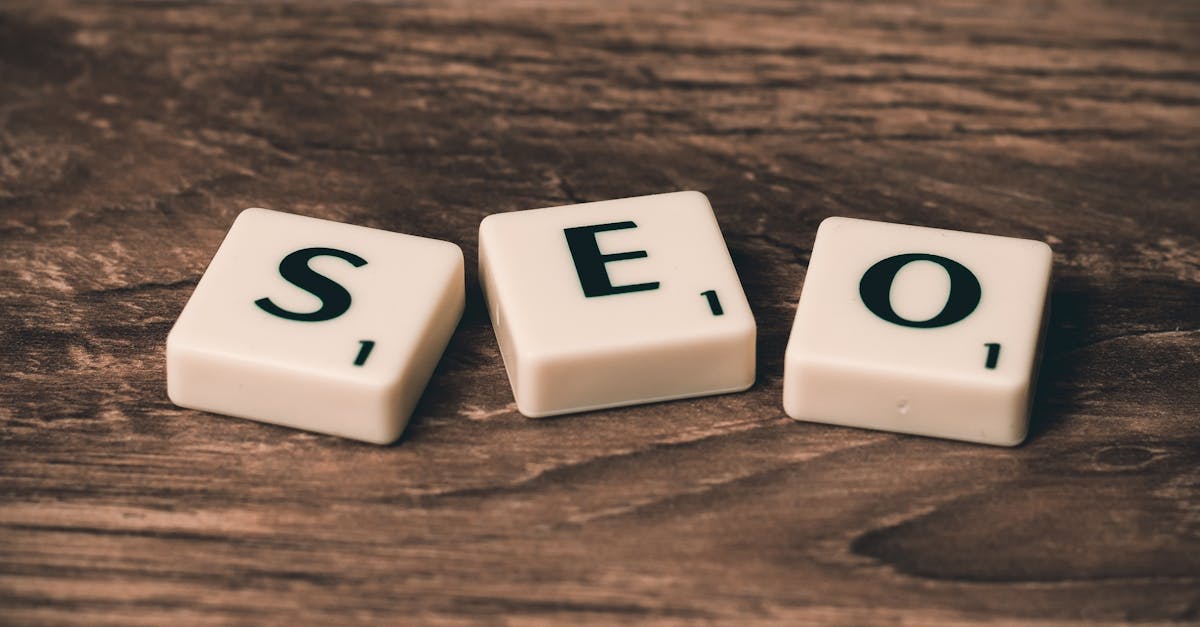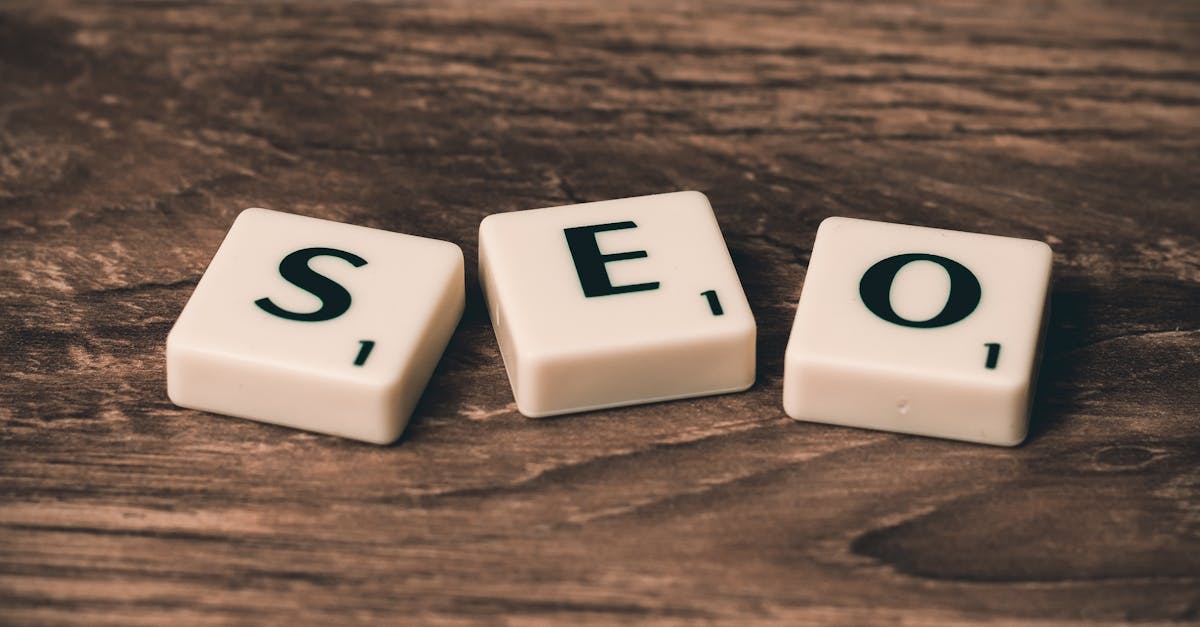
Table Of Contents
Measuring Success in Search Engine Marketing
Measuring success in search engine marketing involves tracking several key metrics that indicate the effectiveness of your campaigns. These metrics often include click-through rates, conversion rates, and return on investment. Monitoring these indicators helps businesses understand how well their efforts in Search Engine Advertising (SEA) and organic strategies are performing. It is essential to assess both paid and unpaid channels to gain a comprehensive view of overall effectiveness.
Alongside traditional metrics, the integration of Search Engine Optimization (SEO) performance is critical in evaluating success. High rankings in search results, organic traffic growth, and engagement metrics like time on site all contribute to a complete picture. By analysing these factors, marketers can identify successful strategies and areas needing improvement. Continuous adjustment and optimisation based on data insights ultimately enhance the effectiveness of search engine marketing efforts.
Key Performance Indicators
Key performance indicators (KPIs) play a crucial role in tracking the effectiveness of search engine marketing strategies. These metrics provide insight into how well a campaign is performing and help marketers make data-driven decisions. Common KPIs include click-through rates, conversion rates, and cost per acquisition. By analysing these indicators, businesses can refine their approaches and allocate resources more effectively to maximise their return on investment.
In the realm of search engine marketing, Search Engine Optimization (SEO) is an integral KPI. It measures organic traffic generated through search engines, reflecting the long-term success of optimised content and website structure. Monitoring SEO performance aids in understanding audience behaviour and preferences, ensuring that marketing efforts align with their interests. This focus on both paid and organic metrics creates a comprehensive view of a campaign’s overall health.
Challenges in Search Engine Marketing
Search engine marketing faces a variety of challenges that can hinder the effectiveness of campaigns. One significant hurdle is the constantly evolving nature of search engine algorithms. These algorithms determine the ranking of websites, making it essential for marketers to stay updated on changes to ensure their strategies remain relevant. Additionally, competition among businesses can be fierce, with many vying for the same keywords. This saturation makes it difficult for individual campaigns to stand out, thus requiring innovative tactics to capture audience attention.
Another challenge lies in measuring the true impact of Search Engine Optimization (SEO) efforts. Many marketers struggle to connect SEO activities directly to revenue generation. The intricacies of consumer behaviour can make it hard to establish a clear link between clicks, conversions, and overall sales. Furthermore, the reliance on various analytics tools can sometimes lead to conflicting data, complicating efforts to assess the effectiveness of current strategies. This lack of clarity can result in missed opportunities for optimising campaigns and achieving better results.
Common Pitfalls to Avoid
Many businesses underestimate the importance of ongoing keyword research in their search engine marketing strategy. They may start with a set of keywords and expect this list to remain effective indefinitely. However, search trends can shift due to numerous factors, including changes in consumer behaviour and market conditions. Regularly reviewing and updating keywords helps ensure that marketing efforts remain relevant and effective. Ignoring these fluctuations can lead to missed opportunities and reduced visibility in search results.
Another common pitfall is the mishandling of on-page elements, particularly in Search Engine Optimization (SEO). Optimising title tags, meta descriptions, and header tags is crucial for improving search rankings. Many marketers either overlook these elements or fail to align them properly with targeted keywords. This neglect can diminish the effectiveness of a marketing campaign, leading to lower click-through rates and less organic traffic. Ensuring each page is fully optimised is essential for achieving desired visibility in an increasingly competitive online landscape.
The Future of Search Engine Marketing
The landscape of search engine marketing is evolving rapidly, driven by technological advancements and changing consumer behaviours. Artificial intelligence is playing a pivotal role in enhancing search engine algorithms. Businesses are now focusing on more personalised content and experiences for users, which aligns with the ongoing trend of creating engagement rather than just traffic. This shift emphasises the importance of Search Engine Optimization (SEO) strategies that evolve alongside these changes, ensuring that websites remain relevant and visible in search results.
Voice search and smart assistants are becoming increasingly prevalent, leading to a shift in the way users interact with search engines. Optimising for voice search requires a more conversational approach to SEO, incorporating natural language and long-tail keywords. As mobile searches continue to grow, the need for responsive design and fast-loading web pages becomes critical. These emerging trends highlight the necessity for marketers to stay ahead of the curve, adapting their strategies to leverage new technologies while maintaining solid SEO foundations.
Emerging Trends and Technologies
Emerging trends in search engine marketing reflect the ongoing evolution of consumer behaviour and technological advancements. Voice search has gained prominence as more individuals utilise smart speakers and voice assistants. This shift necessitates a new approach to keyword optimisation, requiring marketers to focus on natural language and long-tail keywords. Additionally, the rise of mobile usage continues to influence SEO strategies, encouraging businesses to prioritise mobile-friendly website designs and faster loading times to enhance user experience.
Artificial intelligence (AI) is increasingly integrating into search engine algorithms, making it essential for marketers to adapt their strategies. AI can analyse vast amounts of data, providing insights about user intent and behaviour, which can significantly enhance campaign targeting and efficiency. Machine learning allows search engines to deliver more personalised search results, making it vital for marketers to understand how these technologies work alongside traditional Search Engine Optimization (SEO) practices. Adapting to these changes ensures businesses remain competitive in an ever-evolving digital landscape.
FAQS
What are the two main types of search engine marketing?
The two main types of search engine marketing are Search Engine Optimisation (SEO) and Pay-Per-Click (PPC) advertising. SEO focuses on improving organic search rankings, while PPC involves paying for ads to appear in search results.
How does Search Engine Optimisation (SEO) work?
SEO works by optimising website content, structure, and links to improve visibility in search engine results. This involves keyword research, on-page optimisation, and building quality backlinks to enhance a site's authority.
What is Pay-Per-Click (PPC) advertising?
PPC advertising is a model where advertisers pay a fee each time their ad is clicked. It allows businesses to gain visibility on search engines quickly by bidding on keywords relevant to their products or services.
Which is more effective, SEO or PPC?
The effectiveness of SEO versus PPC depends on various factors, including business goals, budget, and timeline. SEO typically provides long-term benefits and credibility, while PPC can generate immediate traffic and leads.
Can I use both SEO and PPC together?
Yes, using both SEO and PPC together can be a highly effective strategy. While SEO builds organic traffic over time, PPC can help drive immediate results, allowing businesses to maximise their online visibility and reach.

















































